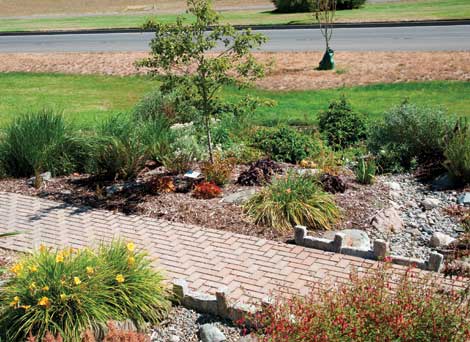In an effort to encourage the installation of rain gardens, the City of Tacoma is offering a generous rebate to homeowners.
The first requirement is that homeowners must be living within the Flett Creek and Leach Creek watersheds to qualify for the rebate, which is $2 for each square foot of hard surface draining to a rain garden (up to a maximum of $2,000).
The Fleet and Leach Creek watersheds are located on the southern and western ends of town in areas west of Pacific Avenue and south of South 48th Street, west of Union Avenue from South 48th up to 6th Avenue, and the peak of the Leach Creek basin reaches from Stevens Street to Mildred Street north from 6th Avenue to North 30th Street.
Qualifying homeowners who install a rain garden and receive the rebate are required to sign an agreement with the city to maintain the rain garden for a minimum of five years weeding, mulching and watering the plants.
“Rain gardens require as much or as little upkeep as a homeowner wants to put into it,†says Mike Carey, environmental specialist and certified arborist with Tacoma’s Environmental Services. “You can choose high-maintenance or low-maintenance plants.â€
“The city website at cityoftacoma.org/raingarden offers a link to the rain garden rebate information and forms. The entire program package can be downloaded.
In addition to the rebate, the city helps homeowners with design of the rain garden, including a free on-site soil test by a member of the Pierce Conservation District and walking them step by step through the project paperwork.
City of Tacoma engineer Jessica Knickerbocker said the rain garden rebate program runs until the end of this year, at which time officials will evaluate whether to continue or modify the program. She advises getting started on a rain garden as soon as possible.
Chris Beale and his wife decided on a rain garden and are glad they did. Beale lives in Tacoma, works for the city of Puyallup in the Planning Department, and is an arborist. He managed the department that oversaw the construction of rain gardens in Puyallup.
“Our first thought was to be good stewards of the rainwater hitting our property, and we wanted to improve our property by having a higher-end landscaping,” said Beale.
He and his wife were planning on installing a rain garden, and the reimbursement program in Tacoma happened to coincide with that decision.
Mike Carey, Environmental Specialist and Certified Arborist with Tacoma’s Environmental Services, said the city makes every attempt to ensure that residents have all the resources they need to build a successful rain garden.
He is a big supporter of rain gardens.
“They are really important because the most appropriate place to control stormwater runoff is at their source, and it is more economically sustainable to infiltrate the rainwater on-site than to try to cleanit up and contain it after it runs down the storm drains,” he said.
“Rain gardens provide a sustainable way to treat runoff at the home and add value and look beautiful at the same time,†Carey said.
The city provides training throughout the year to teach homeowners how to install a rain garden. Carey said homeowners can register at cityoftacoma.org/envirohouse for upcoming rain garden workshops being held at the city’s permanent green building model home, the EnviroHouse, located at the city landfill at 3510 Mullen St. in Tacoma.
A residential rain garden has been built at that location, and Janda Volkmer, EnviroHouse coordinator, is on site to answer questions Wednesday-Friday from 10 a.m. to 3 p.m. and Saturday and Sunday from 11 to 5.
“Most folks are interested in rain gardens and green roof gardening,” said Volkmer, adding that interest in rain gardens is picking up due to our climate.
The EnviroHouse also has six rain barrels on site. Rain barrels are a good way to catch rainwater flowing from a roof downspout. They store rainwater for watering plants, washing cars or other outdoor uses, Volkmer said.
The city offers several workshops during the year on rain barrels. Information on the time and place for these and other sustainable living workshops can be found at www.cityoftacoma.org/EnviroHouse/
Joan Cronk, who wrote this article, is a freelance writer and frequent contributor to Senior Scene.
